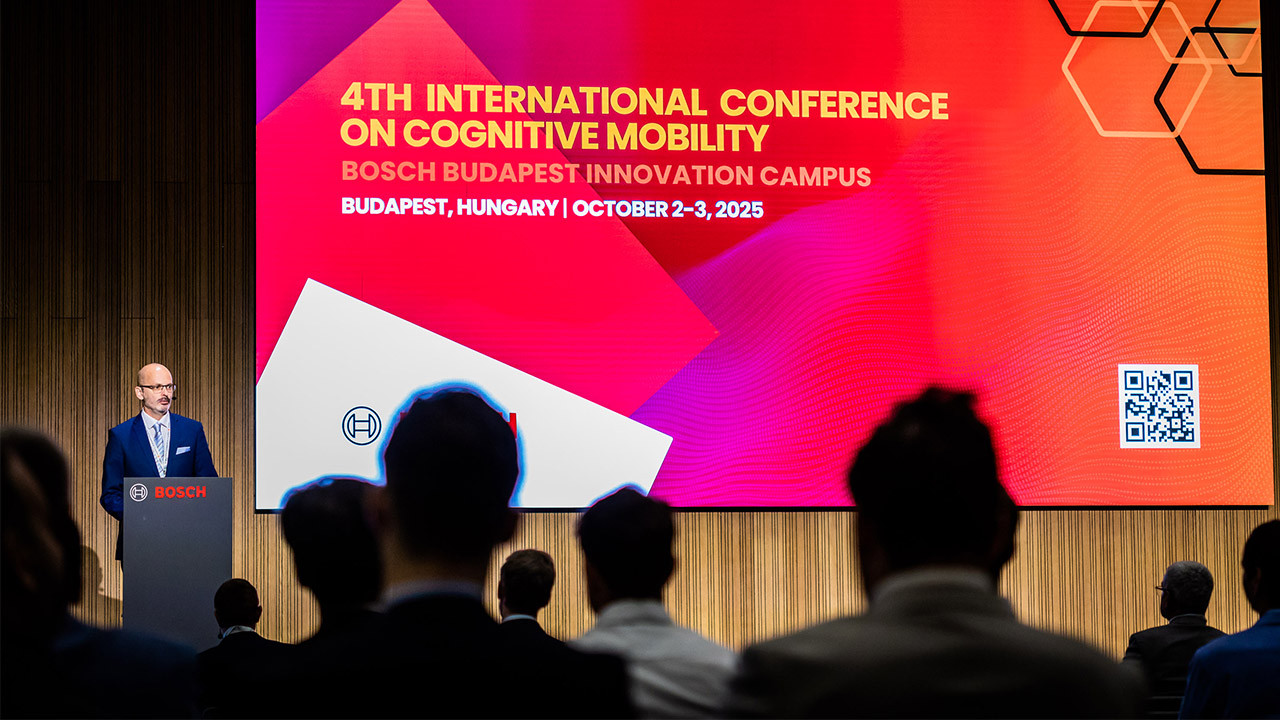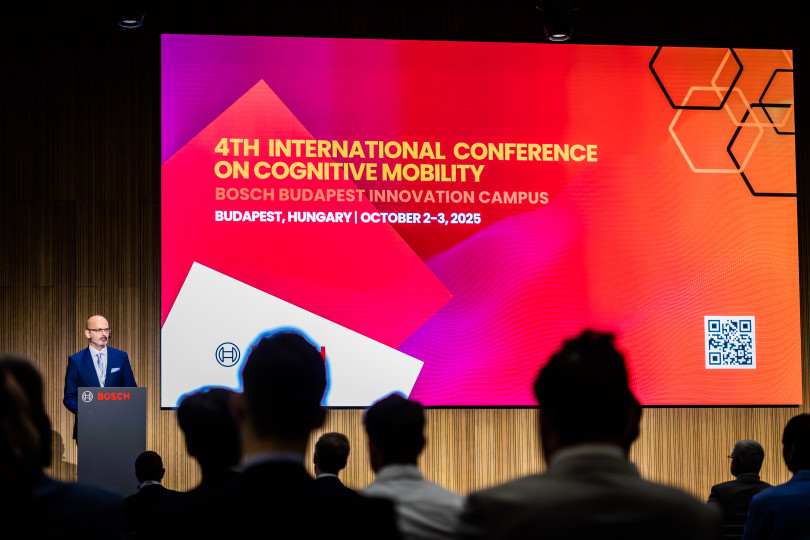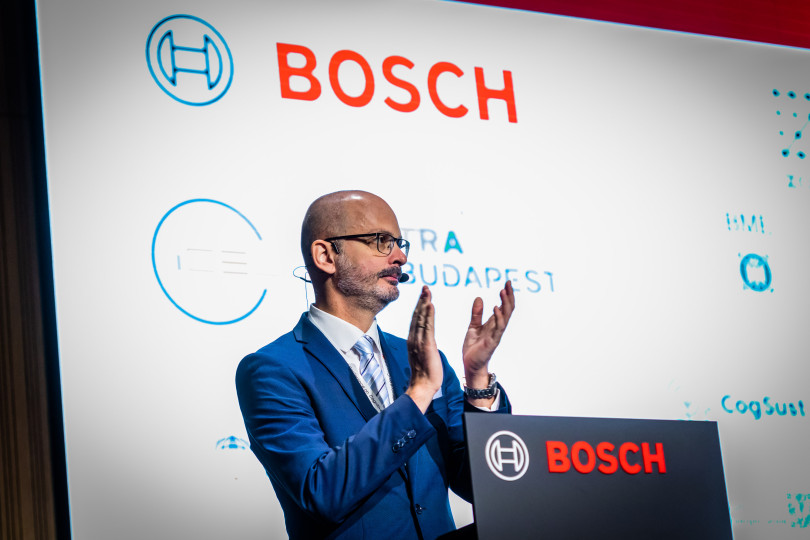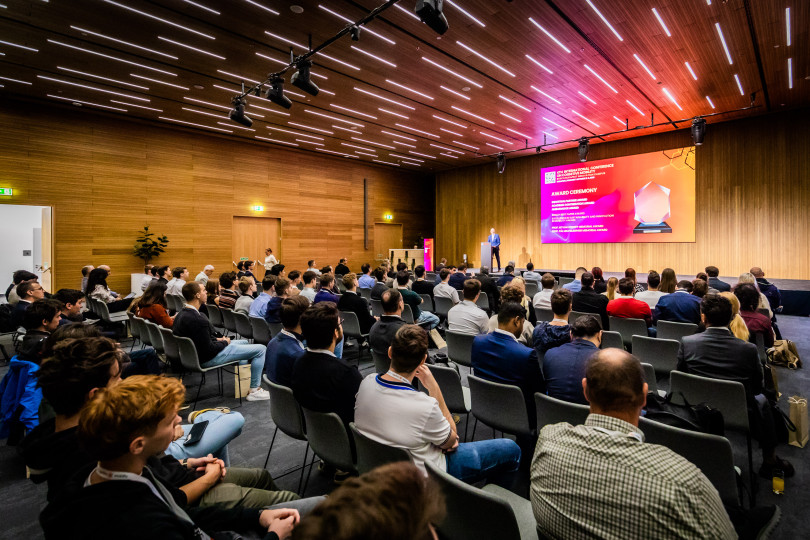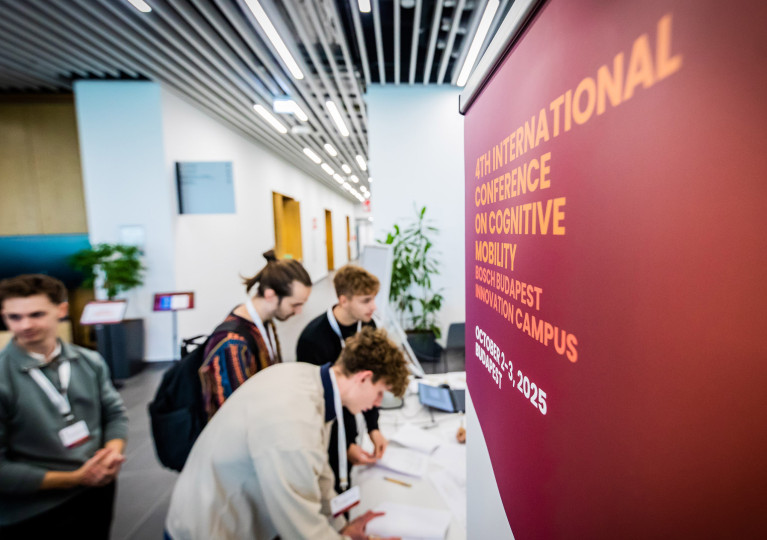Budapest – Global population is rising dynamically, international trade keeps widening, and the trend of urbanization continues. In a challenging global environment, the two-day international CogMob 2025 conference, which began today in Budapest, focuses on the future of people-centered, sustainable, and intelligent transportation systems. Organized in professional partnership with the Bosch Group in Hungary, the prestigious event is once again hosted, as in previous years, at the Bosch Budapest Innovation Campus.
With innovative solutions, we can tackle the impacts of overpopulation and overconsumption
Increasingly crowded cities, globalized supply chains, rapidly growing passenger and freight traffic, extensive transportation systems – on land, water, rail, and in the air. This is what our world looks like from a bird's eye view today. All undoubtedly make our lives more comfortable and affluent. Yet, at the same time, they pose sustainability challenges that science and industry can only address in a future-proof way through collaboration and innovative thinking. Cognitive mobility is a scientific approach and trend that brings together innovative fields of future transportation within a unified professional framework in order to achieve the best outcome.
Hungarian and international researchers in cognitive mobility plan for the future in Budapest
“The aim of the Cognitive Mobility conference, now being held for the fourth time in Budapest, is to create a multidisciplinary international platform. A forum directed for leading researchers and developers in the fields of transportation and automotive engineering, artificial intelligence, social sciences, and cognitive infocommunications, as well as for global players from the industries in question. Our aim is to ensure that different disciplines work together in a coordinated and highly efficient way, to advance the development of intelligent, cognitive mobility of the future” – said Prof. Dr. Máté Zöldy, faculty member at the Department of Environmental Economics and Sustainability at the Budapest University of Technology and Economics, and Chair of the CogMob 2025 conference.
The two-day event in Budapest features more than 60 presentations by renowned international and Hungarian experts, along with panel discussions and impressive industrial demonstrations. The CogMob 2025 conference places special emphasis on key topics such as human–machine interaction and the role of artificial intelligence and machine learning in the mobility of tomorrow. Also on the agenda are issues related to the sustainability of transportation infrastructure, cognitive logistics, and the future of energy carriers.
Progress is only possible by paying attention to environmental and social impact
“Technical innovations create real value and drive progress for the world only if technological developments take social needs and consequences into account and responsibly minimize environmental impact. For nearly 140 years, Bosch has been committed to technologies designed with people and communities in mind. Today, we continue to do everything we can to think about our future through an innovation ecosystem and cross-disciplinary collaboration” – emphasized Dr. István Szászi, representative of the Bosch Group in Hungary and the Adriatic Region.
Smart railways: freight transport can become greener with intelligent innovations
A special feature of this year’s Cognitive Mobility conference is that the second day focuses specifically on the opportunities for rail freight transportation. The significance of this is that the carbon-free, and therefore environmentally friendly, transportation of heavy goods is currently not realistic by road. However, electrified railway lines offer an excellent green alternative. Although, for the competitiveness of railways, the condition and availability of tracks, network capacity, and scheduling must be continuously optimized. The CogMob 2025 conference also explores in detail the technological developments required to make this possible.
It is even feasible without rare earth metals – Bosch is working on a new generation of electric drive systems
Access to rare earth metals is hampered by geopolitical conflicts and supply chain risks in the world's developed industrial countries. In fact, these raw materials are still essential today, for example in the drive trains of electric vehicles. That is why the research and simulation studies conducted by Bosch experts, including Tibor Vajsz and his colleagues, including Dr. István Szászi, are particularly important. The Bosch innovations presented at the conference pave the way for future electric drive systems to fully replace rare earth metals with alternative components. The resulting new types of drives, which are highly efficient and cost-effective to manufacture, could offer an attractive alternative for the electric vehicles of tomorrow.
Come rain or shine: reliable autonomous driving in poor visibility conditions
For autonomous driving, vehicles must be able to “see” the road clearly and reliably recognize traffic signs, which is especially difficult in bad weather. Using real-world and simulated data, Ziyad N. Aldoski and Csaba Koren will present at the conference which types of signs remain easily recognizable in adverse weather conditions and what characteristics can improve detection in the rain and snow. The results provide guidance for developing more reliable sensor algorithms, thus enabling autonomous vehicles to operate safely in changing environmental conditions.
Digital twins can contribute to disaster prevention
News reports from around the world occasionally cover the shocking collapses of heavily trafficked bridges and other road infrastructure. The question is what can be done to prevent them. Tomorrow’s infrastructure is moving toward digital data driven road management. At the conference, Tamás Attila Tomaschek will outline a model that combines digital twins with extensive geographic databases. This model can provide operators with vital, highly detailed information about infrastructure load and wear (such as for bridges), hence allowing for timely intervention.
Budapest serves as a model for expanding electric charging networks
A crucial factor in the widespread adoption of electric vehicles is the geographic availability of charging infrastructure. Expanding electric charging networks, however, requires significant investment, which makes success dependent on whether the spatial rollout of developments can be optimally planned. Omar Alharaeses and his colleagues have developed a decision-support model that offers a reliable tool for the development of data-driven and flexibly scalable e-charging networks. Particularly noteworthy is that the researchers based their model on Budapest, one of Central Europe’s most advanced e-mobility hubs. In Budapest, strategic planning is facilitated by the expanding electric vehicle fleet and the rising number of charging stations.
Which is the greener choice: should we buy electric or conventional cars?
It is widespread misbelief that when buying a car with environmental awareness in mind, the most sustainable option is to choose a new electric vehicle. Research by István Lerchner and Máté Zöldy questions this common assumption. Their analysis, presented at the conference, highlights that the environmental advantage of electric cars over internal combustion engine vehicles only becomes apparent after a certain mileage. Purchasing a used car is almost always more environmentally friendly than buying a new one. Besides, it also matters where our car is actually used: in countries or regions where electricity production involves high carbon dioxide emissions, the advantages of electric cars are significantly more limited compared to internal combustion engine vehicles.
With sports facilities for sustainable cities
By analyzing more than 200 domestic sports-related investments, Richárd Szalóki and Petra Szakonyi examined how the development of sports facilities can contribute to sustainable mobility. The results show that well-located sports complexes can reduce dependence on fossil fuels by creating both motivation and the opportunity for walking and cycling. The research presented at the conference, highlights brownfield rehabilitation for sports purposes as a promoter of innovative mobility. Moreover, it provides decision-makers with insight into how sports facilities can be used as catalysts for sustainable urban development.
For the first time this year: honoring exemplary professionals of the domestic industry with special awards
The professor Michelberger Pál Award commemorating an outstanding figure in Hungarian vehicle research and the automotive industry, will be presented for the first time in the history of the CogMob conference, to the author of the “best automotive article.” Also, the researcher working in the most innovative field of railway transportation will receive the professor István Zobory Award. With these awards, the organizers wish to honor those outstanding Hungarian scientists and innovators whose lives serve as an inspiration and example for today's engineers.
Zita Hella Varga
Phone: +36 70 667-6374
Bosch has been present in Hungary since 1898 with its products. After its re-establishment as a regional trading company in 1991, Bosch has grown into one of Hungary’s largest foreign industrial employers with currently nine subsidiaries. In fiscal 2024 it had total net sales of 2058 billion forints and consolidated sales to third parties on the Hungarian market of 313 billion forints. The Bosch Group in Hungary employs more than 17,400 associates (as of December 31, 2024). In addition to its manufacturing, commercial and development business, Bosch has a network of sales and service operations that covers the entire country.
The Bosch Group is a leading global supplier of technology and services. It employs roughly 418,000 associates worldwide (as of December 31, 2024). The company generated sales of 90.3 billion euros in 2024. Its operations are divided into four business sectors: Mobility, Industrial Technology, Consumer Goods, and Energy and Building Technology. With its business activities, the company aims to use technology to help shape universal trends such as automation, electrification, digitalization, connectivity, and an orientation to sustainability. In this context, Bosch’s broad diversification across regions and industries strengthens its innovativeness and robustness. Bosch uses its proven expertise in sensor technology, software, and services to offer customers cross-domain solutions from a single source. It also applies its expertise in connectivity and artificial intelligence in order to develop and manufacture user-friendly, sustainable products. With technology that is “Invented for life,” Bosch wants to help improve quality of life and conserve natural resources. The Bosch Group comprises Robert Bosch GmbH and its roughly 490 subsidiary and regional companies in over 60 countries. Including sales and service partners, Bosch’s global manufacturing, engineering, and sales network covers nearly every country in the world. Bosch’s innovative strength is key to the company’s further development. At 136 locations across the globe, Bosch employs some 87,000 associates in research and development
Additional information is available online at www.bosch.hu, iot.boschblog.hu, www.bosch.com, www.iot.bosch.com, www.bosch-press.com, www.twitter.com/BoschPresse

